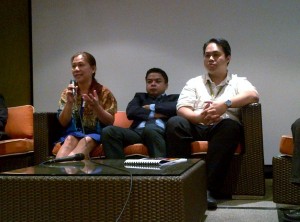Young Filipinos who witnessed poll cheating likely to migrate, says study

Lawyer Grace Agcaoili (left), Chief of the Social Policy and Local Development Section of UNICEF Philippines, answers questions from participants of the 2013 Pinoy Youth Barometer Conference Friday. Also with Agcaoili is Kabataan partylist representative James Terry Ridon (center) and Undersecretary Leon Flores III (right), Chairman and CEO of the National Youth Commission. The study found that Filipino youth consider factors such as the encouragement of friends and relatives as well as witnessing cheating in the elections in wanting to migrate to another country. Matikas Santos/INQUIRER.net
MANILA, Philippines – Filipino youth who witnessed cheating in the elections are more likely to want to migrate compared to those who have not seen cheating, according to a recent study by the Asian Institute of Management (AIM).
“A student who witnessed cheating in local elections is 1.35 times more likely to have an intention to migrate compared to the baseline student [who did not personally witness cheating],” the study said.
This is a 35 percent increase in the likelihood of someone wanting to go to another country, the study added.
David Yap II, an Economist of the AIM policy center, attributed this to the people’s want to effect changes in their government.
“If people want to be able to effect changes in their local government they do it through the elections,” Yap told INQUIRER.net in an interview during the launch of the 2013 Pinoy Youth Barometer Conference Friday.
Article continues after this advertisement“But if they don’t see their votes actually count towards their choice of candidate, [then] their votes don’t count,” he said. “They see that there is something wrong with the democratic process.”
Article continues after this advertisementTheir study, which surveyed around 2,000 students from Luzon, Visayas, and Mindanao, had a subsection on government performance and the recent May 2013 midterm elections.
“So what do they do? They can’t change anything [with the government] so they migrate, they go to another government,” Yap said.
“We observed that students who witnessed cheating firsthand … they were the ones who showed a higher propensity to migrate,” he said.
Friends and relatives
The biggest factors that influence the youth to migrate, however, were the encouragement of friends and relatives who are either already abroad or still in the Philippines.
A student with relatives abroad who encourage migration is 67 percent more likely to have an intention to migrate while those who have friends abroad encouraging migration are 72 percent more likely to want to migrate, the study said.
Meanwhile, a student with relatives that are still in the Philippines and encourage migration are 135 percent more likely to want to migrate. Friends in the country encouraging migration also make students 73 percent more likely to migrate.
The combination of having friends and relatives, both in the country and abroad, encouraging migration will make a student 1,075 percent more likely to want to migrate, the study said.
The other factors that had a correlation to young people’s intent to migrate were whether the student had gone to a public or private school, whether they received remittances from Overseas Filipino Workers (OFWs) abroad, and whether they lived in Luzon, Visayas, or Mindanao.
“Four out of 10 students from private schools plan to migrate compared to three out of 10 students from public schools,” the study said.
“Students from families that receive remittances are twice as likely to have intentions to migrate,” it also pointed out.
When it comes to geography, the study found that “more students from the Visayas and Mindanao want to migrate compared to students in Luzon.”
Several research papers covering issues such as the quality of Philippine education, the unemployment of young college graduates and their challenges in getting work, and migration of workers seeking greener pastures from academic experts were also presented during the conference.
The 2013 Pinoy Youth Barometer study was accomplished by the AIM in cooperation with the United Nations Children’s Fund (UNICEF) and the Philippine Economic Society.